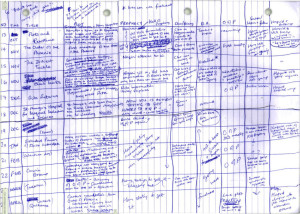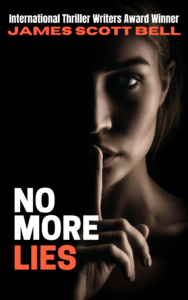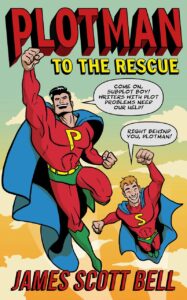by James Scott Bell
@jamesscottbell
[NOTE: I had this post prepped before seeing yesterday’s Words of Wisdom. Consider this an adjunct to that discussion and let’s continue the conversation in the comments.]
At my first ThrillerFest I went to listen to a panel of writers talking about their working methods. I was a bit late to the packed proceedings, so found myself a place to stand in the back. A minute or so later a writer of some repute came in and took the spot next to me.
At about that time writer Andrew Gross was talking about working with Mr. James Patterson (I think Gross was the first, or at least among the first, of the Patterson co-writers). He went into detail about the single-spaced, eighty-page outlines favored by the world’s bestselling novelist.
At which point the writer next to me issued an anguished sigh. He sounded like Sisyphus looking down the hill after his rock rolled back to the bottom.
After the panel, as we walked out, I said to him, “I take it you don’t favor outlines.”
To which Lee Child said, “I don’t even know what I’m going to write in the next paragraph.”
And there we have the two ends of the spectrum on the perennial question new writers ask: Should I outline my novel before I write it?
We all know there are various opinions on the matter. Generally the issue is robustly discussed, with pros and cons, and usually ends with, “Well, do whatever works for you.”
At the extreme ends, however, you will often be treated to voluble zealotry. I call these camps the NOPs and the COPs—“Never Outline People” and “Copious Outline People.”
Your hard-core NOP will often assert that never, under any circumstances, unless you are a complete and utter doofus, must you ever attempt to outline, in any form or fashion, lest your story become an empty shell or bloodless ruin.
I find such conviction fascinating, for nothing in art, or even life, is a matter of such certainty.
Those pressing for the copious outline can also be a bit too fervid in their advocacy.
There are, of course, some famous “pantsers,” such as Mr. Child and Stephen King. Both extol the value of their approach. But I herein offer a theory: those guys, because of their backgrounds (Child from TV, King from voracious reading as a kid) have story and structure wired into them. The outlines are actually there, unfolding in their heads. They’re not so purely NOP after all.
And there are famous outliners, with J. K. Rowling and James Patterson at the head of that class.
My conclusion: all ultimately successful writers outline, whether they write it down beforehand, house it in their brains as they go along, or some mix of both.
Further, outlining should be considered an art. And as with any art, the more you practice, the better you get at it.
I thought about this recently as I revisited the first craft book I ever studied, Writing the Novel by Lawrence Block. He has an entire chapter on outlining. His definition is as follows: “An outline is a tool which a writer uses to simplify the task of writing a novel and to improve the ultimate quality of that novel by giving himself more of a grasp on its overall structure.”
He quickly adds: “Because the outline is prepared solely for the benefit of the writer himself, it quite properly varies from one author to another and from one novel to another.”
That’s where the art comes in. No two jazz pianists are alike, but they all know the scales.
Among the NOPs there is an assertion bandied about which Block traces to the sci-fi writer Theodore Sturgeon: “If the writer doesn’t know what’s going to happen next…the reader can’t possibly know what’s going to happen next.”
Block doesn’t think this “logic” holds up. “Just because a writer worked things out as he went along is no guarantee that the book he’s produced won’t be obvious and predictable. Conversely, the use of an extremely detailed outline does not preclude the possibility that the book will read as though it had been written effortlessly and spontaneously….”
Block does not advocate the “copious” outline, but rather chapter-by-chapter paragraphs to describe the action in each, using only enough detail “so that the storyline makes sense.”
Nor is the writer chained to the outline. Inevitably, things grow and change as you write. In those places, Block emphasizes, be ready to deviate from and rework the outline.
That’s the art of it. Like a jazz riff, but still ending up with a coherent tune with an overall structure. (Yes, there is a school—a small school—of music eschewing any effort at tonal coherence, which creates an effect similar to having your head peppered with a nail gun. But I digress.)
My own practice is to outline 14 “signpost scenes” (explained fully in Super Structure). It gives my story coherence (kind of important for readers) and meaning (the latter by way of the “mirror moment”), but also gives me the freedom to riff my way from signpost to signpost.
I actually do my “pantsing” before I lay out my scenes. I start what I call a “white-hot document,” which is me writing fast, following my synapses wherever they lead. (David Morrell does much the same thing, asking and answering questions like “Why?” and “So what?”)
I’ll open each day by revising, cutting, and adding to the document. This is fun and exciting, as the story begins to bubble up and, most important, take shape.
Finally, I start laying out the signpost scenes and brainstorming scenes I’d like to see. Then off I go and write the thing.
I’ll leave the last word with a writer named Dean Koontz, who I’ve heard has sold a few books:
Occasionally I encounter a critic or a would-be writer who believes that an author should let his characters create the entire plot as they act it out. According to this theory, any pre-planned plot line is hopelessly artificial, and it is supposedly preferable for the writer to discover the direction of the story only as the characters discover it. In some arcane fashion, this is supposed to lead to a more “natural” plot.
Balderdash.
When a master furniture maker crafts a splendid Queen Anne-style table, is he being “artificial” merely because he follows an established pattern? Are the paintings of Andrew Wyeth “artificial” because the artist limits himself to a painstakingly realistic rendition of our world?
The answers to both of those questions are, of course, the same: No!
***
If a writer allows his characters to seize total control, he is actually allowing his subconscious mind to write the book without benefit of the more sober and steady guidance of his conscious intellect, and the result is fiction as formless and purposeless as much of what takes place in the real world, precisely the kind of fiction that frustrates most readers. (How to Write Best-Selling Fiction)
Comments welcome.


 I love the writing craft. I love it the way
I love the writing craft. I love it the way  There are many ways to write a novel. That much has been made quite clear on TKZ and in the comments thereto.
There are many ways to write a novel. That much has been made quite clear on TKZ and in the comments thereto. I keep all my writing stuff in a dedicated folder on my Mac. I worked really hard to come up with a clever name for this folder. I call it “Writing.”
I keep all my writing stuff in a dedicated folder on my Mac. I worked really hard to come up with a clever name for this folder. I call it “Writing.”
 There’s a great Far Side cartoon (among so many great ones from the genius Gary Larson). It shows the back of a man seated at a desk. He has a pencil in his fingers, but his hands are grabbing his head in obvious frustration. In front of him are a series of discarded pages with MOBY DICK, Chapter 1 at the top. They say:
There’s a great Far Side cartoon (among so many great ones from the genius Gary Larson). It shows the back of a man seated at a desk. He has a pencil in his fingers, but his hands are grabbing his head in obvious frustration. In front of him are a series of discarded pages with MOBY DICK, Chapter 1 at the top. They say:
 Half my life’s in books, written pages.
Half my life’s in books, written pages.
 If I may riff off
If I may riff off  A controversy over an award-winning female thriller author has broken out in Europe. That’s because the female thriller author doesn’t exist. “She” is really three men who have been writing under the pseudonym Carmen Mola. When one of their novels won a million-euro prize, the trio
A controversy over an award-winning female thriller author has broken out in Europe. That’s because the female thriller author doesn’t exist. “She” is really three men who have been writing under the pseudonym Carmen Mola. When one of their novels won a million-euro prize, the trio